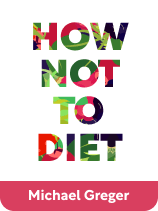

This article is an excerpt from the Shortform book guide to "How Not to Diet" by Michael Greger. Shortform has the world's best summaries and analyses of books you should be reading.
Like this article? Sign up for a free trial here.
What is the book How Not to Diet about? What are the main takeaways of the book?
If you’ve ever tried to lose weight, you’re probably aware of all the conflicting advice about what you should eat. In his book How Not to Diet, Michael Greger gives a straight answer for weight loss: a plant-based diet.
Read more for a brief overview of the book How Not to Diet.
How Not to Diet by Michael Greger
It’s common knowledge that excess body weight contributes to a variety of health problems that reduce life expectancy: increased blood pressure; raised levels of cholesterol and insulin; and reduced immunity against debilitating diseases such as dementia, arthritis, diabetes, cancer, and heart disease.
Unfortunately, many people struggle to maintain a healthy weight and protect themselves from these health risks. This is due in large part to the amount of conflicting advice about what type of diet we should follow to stay in shape.
(Shortform note: Globally, 13% of adults are obese, while 39% of adults and 20% of children and adolescents are overweight. Research confirms that obese individuals are more likely to suffer from health problems that lead to premature death. Statistics from 2017 reveal that 8% of the global population (4.7 million people) died prematurely as a result of obesity. However, while there’s a clear correlation between obesity rates and premature death rates, these statistics don’t account for other lifestyle factors, such as whether, in addition to being obese, an individual smoked or drank excessive alcohol. Therefore, it isn’t clear exactly how many premature deaths are due solely to excess weight, and how many to a combination of unhealthy lifestyle choices.)
In his book How Not to Diet, Michael Greger, physician and best-selling author of How Not to Die, adds a much-needed voice of clarity to the world of weight loss. He draws on extensive scientific research to explore the healthiest and most efficient way to lose weight and keep it off.
Part #1: What Causes Weight Gain?
Before you can lose weight or maintain your current weight, you first need to understand the factors that lead to unintentional weight gain. This knowledge will help you make informed decisions about how to achieve and maintain your ideal weight.
People often blame various factors for unintentional weight gain, such as a sedentary lifestyle, insufficient motivation to stick to a healthy routine, low metabolism, or “fat genes.” However, according to Greger’s research, there’s only one factor that determines whether you put on weight: your calorie intake—the number of calories you consume and what form they take.
(Shortform note: While Greger’s explanation for weight gain may appear reductive to some, research confirms that it really is that simple. John Walker (The Hacker’s Diet) explains that your body needs energy—measured in calories—to function. If you eat the exact number of calories your body needs to function, you do not gain weight—even if your diet consists of foods high in fat and sugar. However, maintaining a healthy weight may seem more complicated than this because the number of calories you burn each day does depend on various factors, such as your activity level, your metabolism, and your genetics.)
In this part of the book, Greger discusses the type of calorie intake that leads to excess body weight. He first explains why we’re naturally inclined to crave high-calorie foods. Then he clarifies how eating certain types of food—those that are high in calories and low in nutrition—contributes to weight gain.
Part #2: Why a Plant-Based Diet Helps Maintain a Healthy Weight
Now that you understand why you crave high-calorie foods and how eating processed foods and animal products contributes to weight gain, let’s discuss why adopting a plant-based diet is the healthiest and most effective way to maintain a healthy weight.
A plant-based diet includes whole grains, legumes, fruits, and vegetables. It excludes processed foods and animal-derived products such as meat, fish, eggs, and dairy. Because it omits foods that are calorie-dense (high in fat, sugar or salt, and starch), it’s naturally high in nutritional value and low in calories. This means that you can eat as much of these foods as you want without having to restrict portion sizes—which makes this diet both healthy and easy to stick to.
(Shortform note: While nutritionists validate Greger’s claim that a plant-based diet is low enough in calories that you don’t have to restrict portion sizes, they do warn that it could lead to nutritional deficiencies and major health problems. This is because plant-based diets lack B12 and are low in heme iron, calcium, iodine, and DHA. Therefore, before adopting this diet, plan out how you’ll fulfill your nutritional needs by adding supplements or specific ingredients. This will help you maintain your weight and keep you in good health.)
Greger explains that plant-based foods have two positive effects that allow you to eat as much as you want and maintain a healthy weight:
- They reduce the number of calories your body stores as fat.
- They decrease your appetite and increase your metabolism.
Part #3: How to Lose Weight on a Plant-Based Diet
Now that you understand why eating plant-based foods helps maintain a healthy weight, let’s discuss how to adapt this diet to accelerate weight loss. Greger suggests four dietary changes to achieve this:
- Consume most of your calories early in the day.
- Eat 30 grams of fiber each day.
- Start every meal with water or foods with high water content.
- Add anti-inflammatory ingredients to your food.

———End of Preview———
Like what you just read? Read the rest of the world's best book summary and analysis of Michael Greger's "How Not to Diet" at Shortform.
Here's what you'll find in our full How Not to Diet summary:
- How eating processed foods and animal products leads to weight gain
- Why eating plant-based foods reduces the calories your body stores as fat
- What dietary changes will help you shed excess pounds and keep them off






